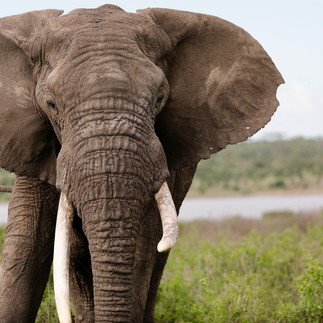How Wildlife Beats the Heat
- John Garcia
- Nov 14, 2022
- 3 min read
Updated: Jun 18, 2023
African Ecosystem
With 2022 being one of the hottest years on record across the globe, we thought it would be interesting to explore just how the animal kingdom manages to stay cool. Since Africa is the second-largest continent on the planet, it contains immensely diverse ecosystems with both abundant wildlife biodiversity and distinctly varied climates. Despite these different climates and biomes, it's traditionally hot all year round. The hottest day on record for the continent reached scorching temperatures of 51 degrees Celsius--which is close to 131 degrees Fahrenheit! Evolutionary adaptations have improved the survival of the wildlife that call Africa home, helping them survive sometimes extremely harsh conditions.
What can we learn from wildlife about staying cool in the summer heat?
Lions

Lions thermoregulate through 1: Panting-- which facilitates respiratory evaporative cooling, and 2: Moving throughout the day to avoid the direct sun. Male lions' manes may impair heat loss, but this hasn't been scientifically verified. However, dominant male lions have been shown to frequent watering holes twice as much as females, potentially indicating they're compensating for the additional heat brought about by having a mane. This is a great reminder that staying hydrated isn't just important, but can often be the difference between life and death!
Zebras
Zebras' stripes have long puzzled scientists and multiple theories have been proposed and tested over the years. At one point, it was thought the stripes' primary purpose was camouflage for predators. There was another theory that the stripes helped to repel tsetse flies. What scientists have finally discovered is that the definition of stripes on different groups of zebras in different regions didn't seem to correlate with the prevalence of tsetse flies or predators. However, stripe definition did correlate with regional temperature and precipitation. This suggests that zebras' contrasting stripes may assist with body heat regulation, but follow-up research is needed to thoroughly test the thermoregulation theory. This theory applies to other animals like giraffes and cheetahs, who would use this natural cooling method. In any case, these fascinating findings may finally explain zebras' funky stripes!
Elephants
Dumbo isn't the only elephant with superpowers. Elephants are the world's largest land mammals and with that size, comes an abundance of surface area for exposure to the sun's heat. It's been recently discovered that in addition to increased blood circulation in their ears to cool off, elephants employ vasodilation in other areas of their body to form"hot spots" of increased blood flow near the surface of the skin. This allows the blood to carry body heat to the skin's surface where it can dissipate. In addition to this complex heat regulation mechanism, elephants fan themselves with their ears and bathe in water to cool their skin and lower their body temperature.
Hippos
As the second largest land mammal, hippos are highly sensitive to the sun and the heat, and typically stay submerged all day in rivers or lakes to stay cool. They emerge in the evening to feed on the grass in the cool of the night and head back to the water when the sun appears. When they're exposed to sunlight during the day, hippos secrete what's commonly called "blood sweat" from their pores, which is a pink mucous-like substance that fills pores to prevent water loss, blocks some ultraviolet light, and inhibits infection. It's a natural sunscreen and skin protectant, and when we go out into the sun, we need to wear our sunscreen, just like hippos!
Whether it’s days spent in the water and mud, large ears, unusual skin patterns, or a lot of sunscreen, there are endless lessons we can learn from the animal kingdom for how to stay cool this summer--many of which are still probably undiscovered! The beautiful complexity and intricate utility found in the natural world is something we probably will never completely understand. But...there's something about these unique mysteries that further fuel our love for wildlife and the environment!
Stay Cool My Friends!
The SFW Team






















